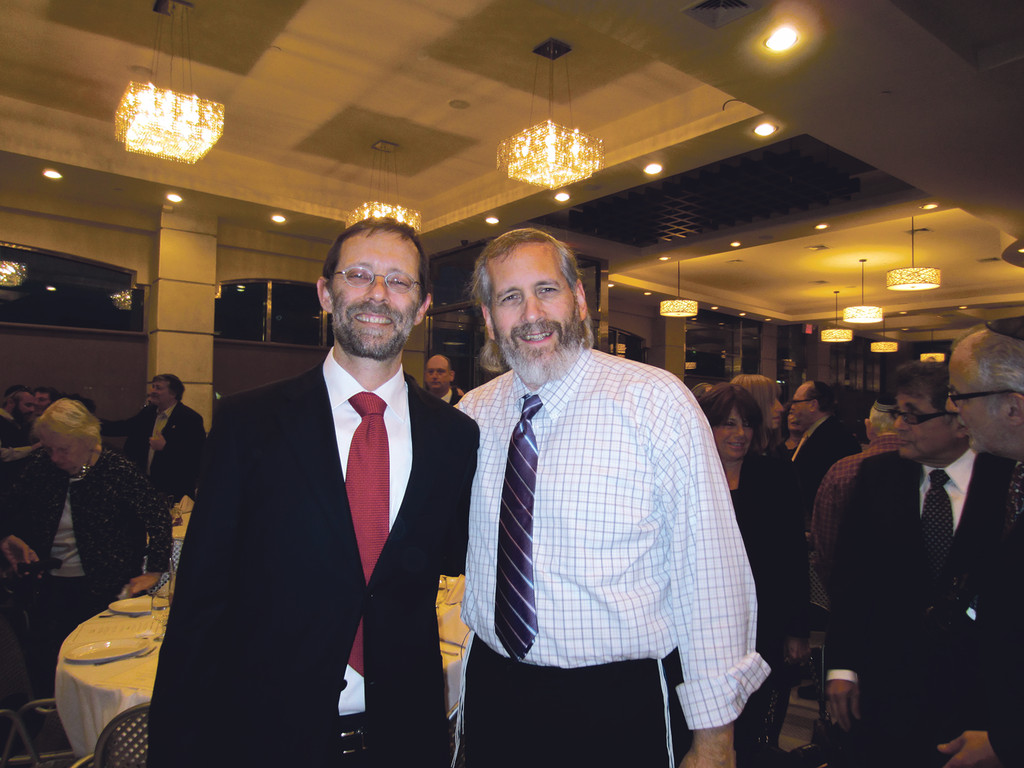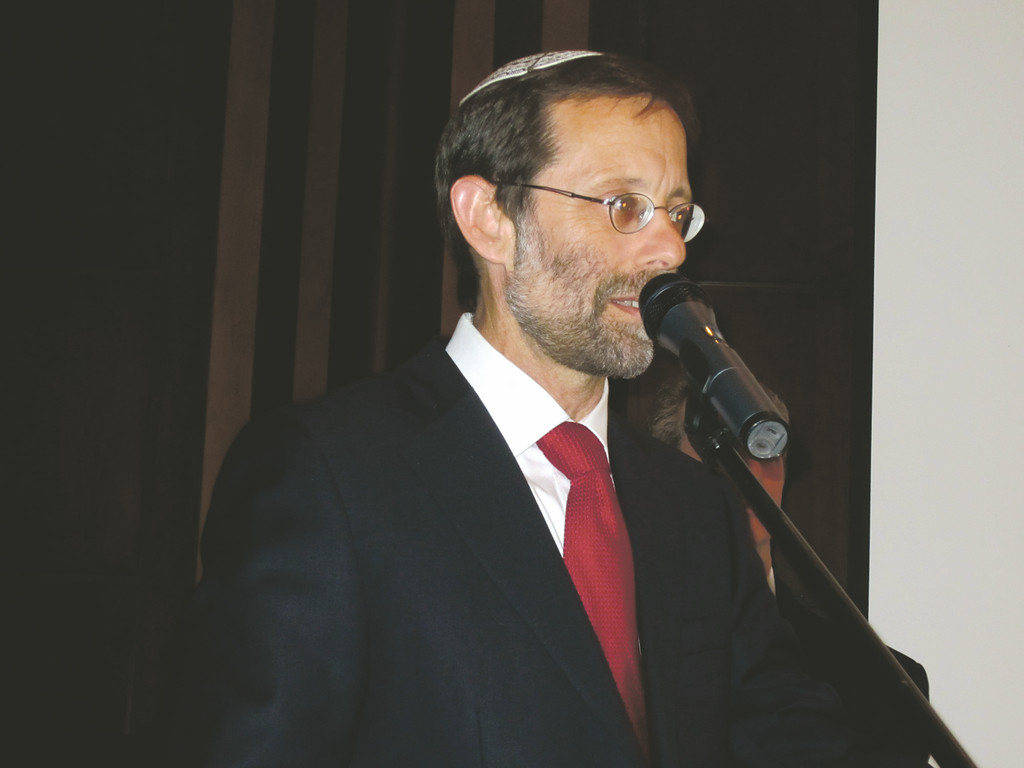MK Feiglin speaks in Queens
After 12 years of striving and proclaiming the need for a Jewish state with a positive Jewish identity as an unseated member of the Likud party, Moshe Feiglin now has joined the ranks of the sitting members of Knesset.
Feiglin, president of Manhigut Yehudit, the Jewish Leadership movement, a faction within Likud, garnered enough support to be number 14 on the Likud list and number 23 on the combined Likud Beitaynu list. “I’m the only new guy in the Likud list,” he said.
Feiglin spoke at a press conference at a celebratory dinner with supporters last Monday in Queens. He agreed that he is part of what has been termed the “second Zionist revolution,” by Israeli columnist Caroline Glick. Glick cited the first as socialist and this revolution as Jewish, where those who identify themselves as Jewish, from religious through secular, have “eclipsed” the secular left. “There is a new hope, a new horizon,” said Feiglin, it “created Bayit Yehudi, the knitted kipot are talking the languag;, but the clear goal is not there yet.”
He noted that Israeli society is shifting to the right but that it is not enough to win the election, since the country needs a “leadership that fears G-d,” he said, “then the rest of the country will follow the leadership.” Manhigut Yehudit is “offering an alternative…building a new kind of leadership.” He stressed the question is not “why Bibi is doing this or that but who is going to come after him.” He stressed that we have to “change the direction of Oslo” and it’s “not 100 years of Zionism but 4000 years of Judaism.”And that “there is no Palestinian nation so there can’t be a Palestinian state.” He cited the 1947 White Paper and that at that time the Jews wanted “to create a Jewish state in the Land of Israel and the Arabs’ goal is the Jews should never have a Jewish state.” In 1964 the PLO was already formed, the Arabs, he said are “always fighting against Jews in areas not held by Arabs. Then it was Tel Aviv, now it is Yehuda and Shomron.” For them it is “part of a big Arab nation. It doesn’t matter what the UN says but what the Jews do. I hope Bibi will build.” He said his goal now is to focus on “inside issues, herut (freedom), mashmaut (purpose, reality) zehut (identity), where we came from, what we are doing on the land and what we represent as Jews.”
He is optimistic that Netanyahu will form the next government. He sees a government melding Likud, Bayit Yehudi, Yesh Atid and the Haredi parties. He said he will help Netanyahu form a “strong coalition so it can function on a day to day basis.”
As for Jonathan Pollard, Feiglin said that he hopes that the “President of the United States will bring Pollard with him when he comes to Israel. If he comes to speak at the Knesset without him he will speak to my empty chair.” He noted in a special discussion in Knesset this past Tuesday regarding Pollard, “who knows how many of us were saved because of him.” Other MKs said that Pollard and the Israeli government have regretted the violation of U.S. law, and Pollard “paid the price” and should be released now.
Feiglin also said that he was “not surprised that the Supreme Court would allow (MK Haneen) Zoabi in the Knesset after the Marmara. They (the Arabs in Knesset) are not letting us run away from the real questions. The concept of the extreme leftist Zionism is to create Israelis instead of Jews.” The Arabs don’t identify as Israeli,he said. “We are left alone with the identity we are trying to run away from.”
Although one can have a religion without the Temple Mount, Feiglin said, “ how can you have a Jewish identity without” it? “We’ve become a religion instead of what we are supposed to be. In 1967, G-d gave us a present (the Temple Mount). It is the secret of life.” Upon his return to Israel, Feiglin entered Har HaBayit. He has entered before and bowed and prayed, considered illegal Jewish activites by the Wakf (the administrative Muslim body overseeing the Temple Mount), and been arrested. This time he asked to enter the Dome of the Rock and was refused entry and ejected from the site. Feiglin cited Rabbi Shlomo Goren’s, z”l, statement that although it is forbidden to enter that particular area, if there is a danger that it will be taken over by foreigners the Azara area can be entered as an act of conquest to prevent that. Feiglin emphasized that Jews should not enter the location of the Temple but as an MK representing “Jewish sovereignty in the Land of Israel” he felt he should enforce Israel’s control over the area. “There is a clear admission of the loss of Jewish sovereignty on the Mount and we must all begin to ‘use our feet’ in order to change the situation.” Said Feiglin, “ Har Habayit is the beating heart of Am Yisrael.”
The Temple Mount, Har Habayit, was where the first and second Temples stood and were each destroyed 2,500 and 2,000 years ago. The Jerusalem hill is currently the site of the Dome of the Rock, and the Al Aqsa mosque, structures built in 691 CE. When Israel recaptured Western Jerusalem and the Old City in 1967, finally reclaiming the site of the Temple after 2,000 years, then General Moshe Dayan pulled down the Israeli flag the IDF had put up there and surrendered the area to the Muslim Wakf who has maintained control over the site restricting Jews from free access there. Although some rabbinic authorities prohibit Jews from entering the Temple plaza, other rabbinic authorities permit Jews to visit the site providing they undergo a purification ritual, have in mind the proper reasons for going there, and entering only in the areas delineated and permitted by these rabbinic authorities. (Consult your rabbi)
Feiglin comes across as reserved, he speaks evenly and emphatically, to the point and from the heart. He wears a dark suit and tie, a knitted kipa, wire rimmed glasses and neatly trimmed slightly graying beard. His roots go back to the “First Aliyah”; his family came to Israel in 1889 and were among the founders of the northern settlements in Israel. His grandfather Avraham was the first child born in Metulah. Although his ancestors were Orthodox, as time went on. his extended family now has members ranging through ultra-Orthodox to secular, right through left.
Born in 1962, Feiglin grew up in Rehovot, studied in the Or Etzion high school yeshiva and enlisted in the army for full service becoming an officer in the engineering corps. After four years of service he moved with his wife Tzippy to Karnei Shomron. He opened a successful window washing company for high-rise buildings and later a hi-tech company. At that point, then Prime Minister Yitzchak Rabin signed the Oslo Accords with Yasser Arafat and the Palestine Liberation Organization (PLO). (In 1993, the Oslo agreement involved creating the Palestinian Authority and agreeing to give up Israeli territory to Arab control, including Gaza and areas of Judea and Samaria. Arafat was to state that Israel has a right to exist, stop terror and revoke anti-Israel clauses in the Palestinian National Covenant. The Israelis gave up Gaza and other areas to Arab control. The Arabs have not implemented their part of the agreement.)
Warnings of the dangers of this agreement were ignored and Feiglin left private life, joining with friend and neighbor Shmuel Sackett to form Zo Artzeinu (This is our Land) a grass roots civil disobedience protest movement. In August 1995, 100,000 demonstrators from a cross section of Israel blocked over 100 major crossroads throughout Israel, stopping traffic and paralyzing the country, bringing attention to the cause and catapulting Feiglin onto the political scene. He was arrested, tried for sedition and ultimately sentenced to six months of community service. Zo Artzeinu campaigned for Likud’s Benyamin Netanyahu, its volunteers handing out fliers in the streets, ultimately getting Netanyahu elected by a narrow margin. Feiglin wrote two books, “Where there are no Men” and “The War of Dreams.” When Likud shifted to the left, befriending Arafat, Feiglin decided that he would take over the Likud from within. He joined the party, encouraged others to join and was placed on the list. Zo Artzinu morphed into Manhigut Yehudit in 1995 promoting “belief based leadership” and joining and forming the largest faction within Likud. He ran for the head of the party against other leaders including Netanyahu three times, gaining votes in each election and winning 24% of the vote in 2007. Notes the Manhigut Yehudit website: “By joining the Likud, we have succeeded in bringing our will into mainstream public awareness. Jewish leadership is no longer a dream.”









